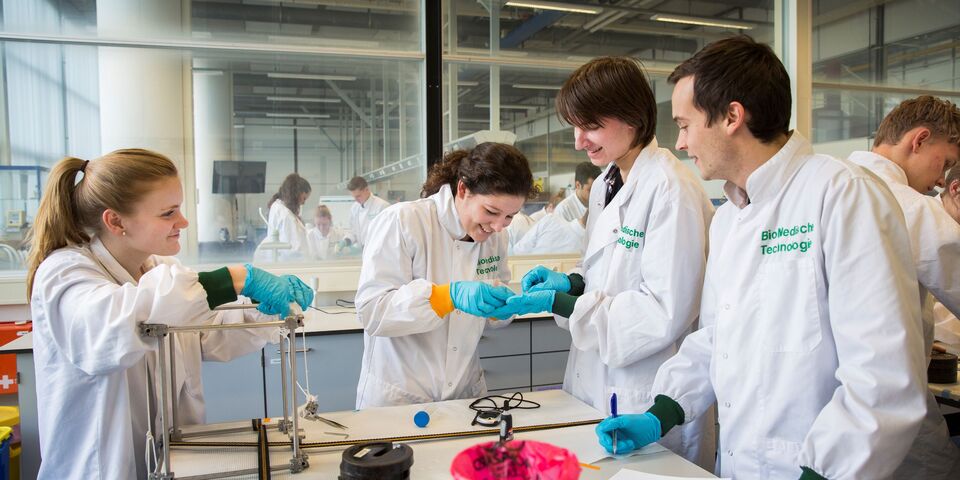Dutch continues to be important at Biomedical Engineering
While the process of Anglicization in Dutch higher education continues – as was concluded by the Language Union – and the adopted working language at TU/e has been English for almost two years now, the bachelor’s programs at Biomedical Engineering remain Dutch-taught for the most part. One of the reasons is because many graduates will end up working in Dutch healthcare facilities, dean Maarten Merkx says: “They need to be able to communicate about biomedical matters in Dutch at a required level.”
English is what Latin used to be in the past: the language of science, used by academics all over the world to share research results. Still, the discussion about Anglicization in higher education regularly keeps cropping up, because why is it that students at Dutch institutions are taught in English? Last week, the discussion was sparked by research results published by the Dutch Language Union.
TU/e didn’t compromise and made a firm decision: on 1 January 2020, English was adopted as the university’s working language. The policy is as follows: English when necessary, Dutch when possible. Practically all programs are English-taught at this point, and a significant number of students at TU/e are internationals.
However, there is one proverbial village of Gauls from the Asterix comic book series on the university campus that still holds out: the department of Biomedical Engineering (BME). Both BME bachelor’s programs (Biomedical Engineering and Medical Science and Technology), are Dutch-taught, according to the TU/e website. That makes them unique at TU/e.
Incidentally, English is also gaining ground at other institutions, the Language Union concluded: only 28.1 percent of Dutch students have enrolled in a purely Dutch-taught program. Nearly half (48.5 percent) enrolled in a program with courses that are taught in both Dutch and English. And 14.3 percent of Dutch students have enrolled in programs that offer courses exclusively in English.
Bilingual
Dean Maarten Merkx would rather say that the BME bachelor’s programs are bilingual instead of Dutch-taught. “We expect that our students are able to communicate about their field in Dutch as well as in English. Many of them will end up working in Dutch hospitals and other healthcare facilities, where Dutch is the working language. At the same time, English is the working language in science, which is why they also need to have good English commutation skills.”
What does bilingual education look like in daily practice? That depends in part on the teachers, Merkx says. They teach in the language in which they can so do most effectively, and in some cases, that’s (still) English. Moreover, textbooks and other teaching materials are often in English.
However, “eighty to ninety percent of the major courses are taught in Dutch,” Merkx estimates. “Throughout the bachelor’s program, the number of English-taught courses will gradually increase, and students will also have to write their reports in English more often, or give presentations in that language.”
This results in a gradual transition to the master’s phase, because the master’s programs at BME are fully English-taught. “Not necessarily to attract international students, but because we believe that it’s important for our students to become proficient in English. During the master’s program, they become part of research groups, in which practically all scientific communication takes place in English. What’s more, 80 percent of master’s students travel abroad for their traineeships.”
Depth
The BME bachelor’s programs are taught in Dutch, which makes them less accessible to international students. That is why virtually all the students at Biomedical Engineering and Medical Science and Technology are Dutch, Merkx confirms. However, student intake has increased over the past four years – since the introduction of the Bachelor College, which resulted in the current form of both bachelor’s programs – from 120 to approximately 240 students annually, he says. “A fine number for our program, which is why we see no reason to recruit students from abroad.”
The fact the new students don’t have to overcome any language barriers during lectures is an advantage, the dean believes. “What we want to do in the first place, is to impart enough depth to our students in a broad area of natural sciences. The best way to do so is in the language in which students and teachers are most proficient.”
No pressure
Doesn’t BME feel the pressure to also become (more) Anglicized? “As yet, we see no reason why. It’s something that each department needs to consider for itself – and I think that’s a good thing, because each department is different. We are the only department in Eindhoven, but other universities also commonly offer Dutch-taught bachelor’s programs and English-taught master’s programs. And our biomedical engineers are greatly appreciated in both the national and the international field.”
And how do the students and staff members feel about the language choice? “The majority of the staff is in favor of the current bilingual bachelor’s programs. And as far as the students are concerned: we didn’t ask them to fill in a survey, but when I talk to students, I hear that there is a group that doesn’t really care, but there’s also a group that greatly appreciates the fact that our bachelor’s programs are Dutch-taught. For some of them, it was a reason to choose our study program.”



Discussion